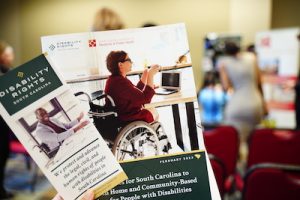Disability Rights South Carolina and the South Carolina Institute of Medicine and Public Health release new Olmstead Report and Recommendations
March 1, 2023Disability Rights South Carolina (DRSC), the designated Protection and Advocacy System for South Carolina serving people with disabilities, in partnership with the South Carolina Institute of Medicine and Public Health (IMPH), hosted a press conference to discuss and release a new report: Opportunities for South Carolina to Strengthen Home and Community-Based Services for People with Disabilities.
The report includes the history behind the 1999 Olmstead ruling, how it’s affecting South Carolinians today and the opportunities for state and local entities to plan and collaborate to improve the lives of people with disabilities across the state.
Many people with disabilities in South Carolina live in an institutional setting or are at risk of being institutionalized. In 1999, the U.S. Supreme Court decided Olmstead v. L.C., ruling that the Americans with Disabilities Act (ADA) prohibits unnecessary segregation in such settings. People with disabilities have a right to live and receive services in a community-based setting — providing them independence and opportunities to fully participate in their communities.
The Olmstead ruling defines the responsibility of each state to develop an Olmstead plan, which South Carolina does not currently have. The United States Department of Justice (DOJ) outlines several requirements for an Olmstead plan and emphasizes that it must be a working plan with concrete and reliable commitments for providing individuals with disabilities opportunities to live, work and be served in integrated settings.
“This report presents the state of South Carolina with an opportunity to plan, collaborate and execute actions that will improve the lives of people with disabilities across the Palmetto State,” says Beth Franco, executive director of DRSC. “We want people with disabilities to be able to join the workforce, pursue an education, volunteer and participate in the community free from unnecessary limitations.”
The report includes interviews with state agencies, community organizations and South Carolinians with disabilities, which revealed a number of barriers to Olmstead compliance, including the following:
• Health care workforce crisis
• Waiting lists for Medicaid waivers
• Employment opportunities for people with disabilities
• Accessible Housing
• Accessible Transportation
• Assistive technology
“South Carolina can expand on the work it has already done to become a leader in strengthening home and community-based services,” says Maya Pack, executive director of IMPH. “The recommendations in this report can be a key step in improving the lives of people with disabilities in our communities and beyond.”
There are currently 53 Olmstead-related cases in Circuit Courts of Appeal across the country — including North Carolina, Georgia and Louisiana. To avoid continued violation of the Olmstead ruling and the risk of litigation that has taken place in other states, this report created by DRSC and IMPH outlines specific recommendations for South Carolina to move forward with an Olmstead plan, including:
• Assigning an Olmstead compliance coordinator and Olmstead implementation council
• Developing a South Carolina Olmstead plan
• Distributing South Carolina Olmstead plan responsibilities
• Implementing an accountability and evaluation process
This report is the result of many local agencies working diligently to improve the lives of South Carolinians. The findings are meant to be shared broadly to inform policies and practices to protect and enhance the lives of people with disabilities in the state today and in the future. For information on the report, DRSC, IMPH and more, access the full report.
About Disability Rights South Carolina
Disability Rights South Carolina (DRSC) is the federally mandated Protection and Advocacy (P&A) system and the Client Assistance Program (CAP) for South Carolina. P&As are the only legally based advocacy organization established by Congress to protect the rights of all individuals with disabilities. DRSC helps people with disabilities understand and defend their rights. DRSC provides a variety of services, including client assistance, training, abuse and neglect investigations, legal assistance, and advocacy for change. The DRSC mission is to protect and advance the legal, civil, and human rights of people with disabilities. Learn more at https://www.disabilityrightssc.org/
About IMPH
The South Carolina Institute of Medicine & Public Health (IMPH) is a nonpartisan, nonprofit organization working to collectively inform policy to improve health and health care in South Carolina. In conducting its work, IMPH takes a comprehensive approach to advancing health issues through data analysis and translation and collaborative engagement. IMPH seeks to achieve its mission by convening a diverse group of stakeholders around health issues important to South Carolina. Learn more at imph.org





















